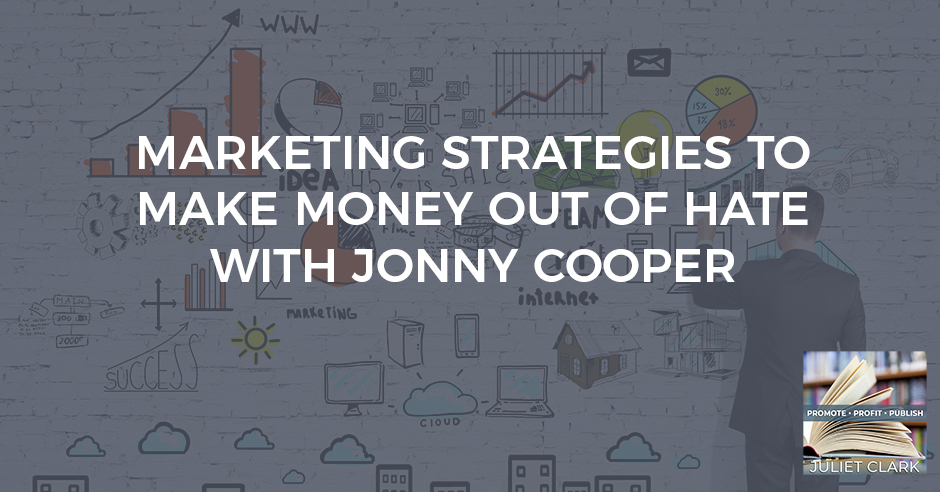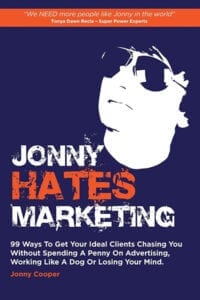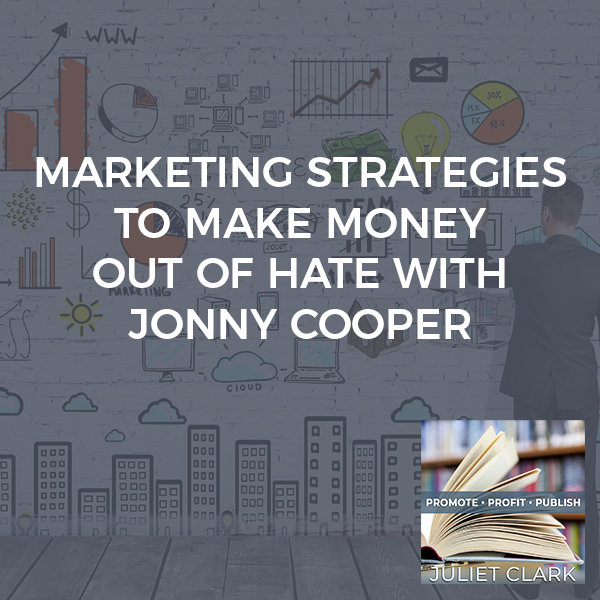
Have you ever hated something you’re doing that you became good at it? Business coach and mentor, Jonny Cooper, hated marketing to the point that he developed strategies to make it easy, not just for him but also for everyone. Learn how to easily get the ideal clients that fit your business model and vision to produce the best results possible both for you and your client. He emphasizes the importance of entering your client’s minds to understand them on a top-level in order to provide a genuine desire to serve. Learn why you need to have a clear proposition and a defining service that will separate you from the herd and stand out in a highly competitive industry.
—
Watch the episode here
Listen to the podcast here
Marketing Strategies To Make Money Out Of Hate With Jonny Cooper
I want to remind you before we get started to go over and take our Promote, Profit, Publish Quiz. You can find that at www.PromoteProfitPublishQuiz.com. Find out where your skillset lies when it comes to lead generation, building a platform, and all those things you need for visibility of your book in the world. Also, go to YouTube and follow us over on Super Brand Publishing and subscribe. Go leave us a review. We’d love to hear from you about what you think of the show.
Our guest is British author, piano player, international racing driver and business coach, Jonny Cooper. He’s the Founder of Jonny Hates Marketing. Since growing a business to eight figures and exiting, he’s been supporting coaches, trainers, therapists, and consultants who are serious about building their thriving practice, changing the world and enjoying life of the effortless abundance. His Client Attraction Blueprint programme is filled with eager students every month. He’s closing in on his mission to impact the lives of a million professionals by 2025. His Three Pillars of Effortless Marketing provide a template for universal success in growth to any aspiring coach and therapist. He’s passionate about increasing the average income across the profession. He’s also the voice behind the legendary Jonny Hates Marketing Facebook Group and swears that he does hate marketing. Welcome, Jonny.
Thank you.
What peaked me to have you on the show is therapists are such a unique group out there. They’re trained in many facets and when they put themselves out in the world, they try to market. Every single one of them all suffer from FOMO. How do you cure that?
There might be a slight difference in terms between the UK and the States. Therapists in the UK are not necessarily licensed medical practitioners, but they’re effervescent heart-centered entrepreneurs, people who do NLP. They have generally built up a wide range of skills, experience and knowledge. It becomes a smorgasbord or a jumble sale, a yard sale where it’s got a little bit of everything. The first realization that we try and bring to that community is nobody cares about any of this stuff. The secret to promotion on organic marketing is to enter the conversation that’s going on in your client’s heads.
The client has yet to be born. He wakes up in the morning and goes, “I must get myself some hypnotherapy. I must get me some NLP.” Those are not conversations that clients have either with others or to themselves internally. Therefore, showing up in the world saying, “I’m an NLP master practitioner,” or “I’m a hypnotherapist,” that has little or no impact on anyone. Particularly, not your ideal clients because the people who need hypnotherapy or your NLP work are suffering from something which is bugging them.
They’ll be talking about that and not about the need for him to therapy. They’ll be saying, “I wish I could stop smoking,” “I wish I could fit into this dress,” “I wish I could get rid of this knot in my stomach every time I think about talking to my boss.” The whole gamma of anxiety, stress, addictions and all that stuff that these tools, hypnotherapy and NLP might cure. I always encourage them to straight away understand the distinction between a tool and an actual promotable solution and message the way you show up in the world.
People buy products. They don't buy ideas. Share on XIt’s such a great marketing piece right there, because nobody cares about your process. They care about the results.
They definitely don’t care about your qualifications. The number of people who show up on LinkedIn and they start the headline with the word Founder and CEO, Founder and President. I did a LinkedIn search, that’s all you see sometimes when you’re looking through profiles to find interesting people. Nobody cares. Well done, you’re a founder. You call yourself a president of your business, it’s brilliant. We need to get real. Start talking about what we bring to the world, what’s the big transformational benefit that people get from us. Why’d we have to invent you if you didn’t exist?
How did you get into all this? I have to ask you, international racing driver?
It’s an itch which has not yet been fully scratched. I still am a driver of racing cars. Although, not so much in the last years, I’ve been building the business, and because no one is going racing. I’ve driven lots of fast cars, wrecked lots of fast cars, spent lots of money that I could have spent more wisely, perhaps.
How did you get on this journey to where you are? You mentioned that you had an eight-figure business. What business did you start out in and how did you end up here?
Me and another chap, we launched our business in the mid-‘90s and we sold it in 2003. We had an eight-year run at it, financial consultancy, pensions, investments. We build on it from scratch, just the two of us. When we sold it in 2003, we had 200 staff and 8 offices around the UK, £10 million. In your money, that’s probably $15 million. We made a £1 million profit in 2003. When you make a profit over seven figures, it puts you into the multiple valuation, it makes your business more valuable to other people. We took an offer to sell at that point.
I fell into coaching consultants out. I never intended to be. If anything, I’m an accidental business coach. I was being asked by some of the former clients in that business to help them with their businesses. I got dragged into these classic rags to riches to rags again story because I got dragged into being “Jonny, the go-to guy for business advice,” a generalist. I had a rag bag of clients over fifteen years, helping them with growth marketing sales, funding, raised a few million quid for small businesses, exit strategies, HR even, social media and learning on the fly, knowing a little bit more than my clients did at any point in time. It was a step ahead. It’s like the cartoon. Bugs Bunny was in front of the train, laying in the track, sleeping as the train is coming towards him.
By 2015, I had this crazy portfolio of clients. Most all pay me too little and expecting too much. I realized that what I was doing wrong was I was a generalist. I was very vague with my offering. I had the vagueness virus as I’ve called it for many years. I was working all hours, mostly one-to-one. I started digging into some of these globally renowned coaches, but mostly from over the pond from us, in your country, people like Frank Kern and Tony Robbins. What I’ve noticed when I looked at a lot of these different coaches, they had what I have nailed that characterizes my three pillars. My three pillars of client attraction. The first one is the what. What do you do to have a clear proposition? Do something which separates you from the herd. Brand a method if you can, as your own particular thing.
The second pillar is the who. Who is it for? I fell prey to this for more than a decade where I was serving anybody who would knock on my door because they look like they’re going to pay me something. That’s a crazy way to work. You spread yourself too thinly. You end up underperforming, underdelivering and getting underpaid. The third pillar is productizing your services, the how. We’ve got the what, the who, and the how. The how is how you deliver what it is you deliver. You’re well into this, Juliet. I know most of us smart coaches around the globe who are already doing this, but selling your time by the hour, one-to-one sessions with individual clients, it’s a bonkers way of trying to build a business because you’re always going to run out of time before you run out on ambition.

Marketing Strategies: The secret to promoting organic marketing is to enter the conversation that’s going on in your clients’ heads.
There’s never going to be enough hours in the week to hit all the marks, fear, revenue, and effortless input they already achieve. I said to a therapist who was looking to get 25 hours a week of therapy one-to-one, “You must be mad. Why do you want to do that?” That’s the worst thing that could happen. Imagine, 25 of hourly paying clients, back to back across a working week. What else are you going to do? How are you going to eat? When are you going to go for a pee?
The third pillar is the how, and this means productizing your services, creating programs that more than one person can join at the same time. Corral like-minded people together, look for your ideal clients, leverage your time, get paid more than once for doing the same job. I pretty much got into the what, the who and the how, the three pillars in place in my business and I’m showing other coaches, therapists and consultants that had to do the same for their business. That’s what I do.
What I loved about your model is I have a group program, but it’s a rather large group program they’re in it for a year. You have an intensive program where you only take a very small number a month. You tell us about that and why it works so well for you.
There are number of things that behind the longevity of it and the underlying success. It’s called the Client Attraction Blueprint. People don’t get confused about what it is. They know what’s in it. If a coach or therapist wants to discover a blueprint for client action, they’re already moving towards the CAB. The other thing that’s responded to the success is that, yes, it’s a small group program. It’s high energy, lots of attention and a small group. Only four people each month join it. The other thing that’s driving that success is my sheer mindedness and persistence. I don’t like reinventing the wheel and I don’t like confusion in my own business. I don’t like overwhelm. I like to keep things simple.
I launched my signature program, the CAB, in March 2018. Determinedly, I had sold out monthly intake every single month ever since. We had to launch CAB27 on the 26th of May 2020. It’s 27 consecutive intakes. I don’t know if there are many practitioners around the world who could say that they’ve done that with that consistency. It seems to me to be an underlying thread in all successful businesses that showing up consistently, doing the same thing, getting the same results and within that, learning how to scale it, but without breaking the model, doing more of what already works. For the first time in May 2020, it caught me, we’re launching CAB in 27 and 28 in the same month. It’s the first month on teaching two of these. We’ve already got one sold out and the other one is half sold.
It was two more places for me. It shows that the demand is there both in my community and the wider coaching world. The reason it’s taking so long is I’ve been looking for a trusted delivery coach to deliver the second one. I don’t want to live two in a month because it’s too much work. I found a wonderful lady from Florida. She’s going to be delivering CAB 28, pretty much in pilot with me delivering 27. She can see the way I’m talking about which is familiarity. It is the beating heart, my business. I encourage all my coach and therapist clients to discover what’s their version of the CAB? How would it work? Is it a group coaching program like mine that lasts for twelve weeks? We launch it once a month. Is it a shorter program like six weeks? Is it a twelve-month commitment? Is it a subscription membership? That can be as effective. Whatever it is, productize your services. Build a program. People buy products, they don’t buy ideas.
What I love about the intensive on that is we are finishing up the last of our year clients and we’re going to something a little shorter because one of the things we hear a lot is, “How much time is this going to take me?” A year is a long time to commit to. We’re going to go back to twelve.
A client that’s not the right fit will suck the life out of you. Share on XIt’s wonderful to learn from direct experience with clients. It probably took you a year to realize that there was a different way to do it. A lot of coaches are guilty of chopping, changing and inventing stuff in a vacuum that feels like it might be a good idea. There’s no better way to create a product and understand deeply what it is that your clients want. You can only do that by working with your tribe for a bit, listening to them and getting feedback. You said something interesting about the length of it. I’ve pretty much got a hybrid now because when someone joins the CAB, the promise to them is that we will work together for a year, but we got most of the work done in the first 3 months or first 12 weeks.
In the rest of the year, there are members of my subscription community which is a non-CAB, you’d pay £67 a month, about $82 a month. If you join the CAB, you get twelve months membership in that. We do work together for a year, although as you’ve suggested, it’s not as intense. There are not twelve months of hard grind. Once, they’ve got the basics and the first three months, they hang out in the subscription community and we meet once a week and shoot the breeze, make sure everyone’s on track.
That’s great because one of the things that we do different in our program is yes, we’re together for a year, but we have twelve weeks and then we repeat the twelve weeks. We do that because we want you to pick up skills, get familiar with them and then move on to the next piece that you missed. What I find in a lot of these longer programs, which you probably take care of with your subscription, is that people pick up what they need right then, but there’s so much more that they put on hold because they get overwhelmed. That’s what we do, is go through it the first time, get what you can, we’re going to go through this again and you’re going to pick up. I find by the 3rd or 4th rendition of it that they’re not picking up any more. They’ve moved on to the next thing. It’s good food for thought in what you said about that twelve weeks about getting intentional with that twelve weeks and you’ve got to get in here and learn that.
What attracts them is that we will be working together for twelve months, but we get most of the work in the first twelve weeks. It’s quite a powerful hook that people get.
We have the quiz up and running, but it’s the use, it’s the implementation. For a lot of coaching programs, you get the pieces in place and then people don’t pull the trigger and implement. That’s what I like about that shorter program is you have the tools now. Let’s get in there and get them implemented. It doesn’t do you any good to have these skills and not use them.
I fell out with courses. When I decided to reinvent myself from the Jack of all trades, I pitched in with a whole bunch of personal development. In over an eighteen-month period, I spent $20,000 on my own learning. Some of it was rubbish and the ones that didn’t work at all were the distance learning things where they gave you a bunch of downloadable videos. I watched a bit of it and rubs off. There’s a dusty corner of my hard drive that’s got $20,000 of stuff on it. Accountability and action and implementation. I’m the antidote to all that by having experienced the rough end of it. I’m now passionate. I’m making sure that every single module, these four people on the CAB do something in that business and then move that business forward. We don’t move on to the next module until I’m certain that they’re all making progress. No child left behind.

Jonny Hates Marketing: 99 Ways To Get Your Ideal Clients Chasing You Without Spending A Penny On Advertising, Working Like A Dog Or Losing Your Mind
Back in 2017, we sold over 80 of the dusty part of your hard drive at an event. We followed up a few months later with the people who bought it. Over half of them had never even opened it. They paid $1,000 for something that they never even opened. We picked up the phone and we talked to those people who opened it. That’s how we started our group program, was the feedback because they said, “This would have been so much better if we had your help.”
I created a digital version of the CAB or Client Attraction Blueprint. I called it the Client Attraction Academy. It’s £1,000, same price point. We did a bit of a campaign for Christmas, upselling it and we sold twelve. Half of the people, I never heard from again. We’ve set up an accountability part, even in the private Facebook group. Technically, who bought it, I said, “Report your results.” Two or three people are reporting. What did you get from spending fast and quit? It’s like these retail addicts. Do you hear about these people that buy stuff?
They’re like compulsive shoppers.
Yes, and then they leave it in the shop or something. They’ don’t want it. They just want the thrill of paying for it. That’s what it is.
They buy for the thrill. It’s filling something emotionally, but they’re not doing the work. I got a wonder those twelve you had. We’ve been locked down. Why weren’t they taking the course?
We pushed them. Interestingly, 2 or 3 of them out of the twelve have upgraded into the CAB. I did them a bit of a deal about repaying some of what they’d paid because the CAB is a lot more expensive. One thing I realized is that we’re ultimately not responsible for the results our clients get from our work. As long as we show up with a genuine desire to serve and we present our stuff with authority and only show people stuff that we know works, that we’ve proven to work ourselves. It’s almost up to them. I had a conversation with a client about guarantees. I said, “You’re the more important half of this relationship. There are two of us in this. I can only show you what I know works. It’s up to you whether you do it. I guarantee that. I’ve literally no control over it.” I let myself off the hook. I’m very intense about trying my best to make sure people get results, but if they aren’t doing it, they aren’t.
I love that about guarantees because I see people with guarantees all the time and I wonder, “How do you do that?”
That’s a different discussion because you have a guarantee and it doesn’t mean people are dissatisfied if they’re not doing the work. I’ve interviewed some former clients who don’t seem to be making much progress, but they’re still happy. They go, “I enjoyed it. It was great hanging out with you,” but you’re still broke. When these people put that guarantees on the sales pages, it’s not certain not many people are going to claim. An insignificant proportion will ever try and claim the money back.
I have a contract where I have my responsibilities and they have their responsibilities. I’ve had a few people come back. It’s been lucky because I’ve been able to pull the contract out and said, “Did we do this? Did we do that? Did we do X? It looks like I lived up to my part of it. The answer’s no.”
I took somebody on the CAB in the early days that wasn’t a fit. They were getting nothing out of it and I paid them their money back before they even asked. It’s the right thing to do. You don’t want to have angry clients. Our great clients are advocates and ambassadors, the opposite of people who are running around, slagging you off. I’d rather pay people if they’re not getting anything out of it or give them the money back anyway, even though it’s not in the contract.
Jonny was talking about taking on those right clients. When you take a client or two that are not the right fit, they will suck the life out of you. That’s why it’s so important to be empowered to only take on those people that fit.
There’s always been that 80/20 thing. In my old business, there was a general business coach. Twenty percent of the clients would suck at 80% of your energy. Twenty percent of your revenue would come from the clients expecting 80% of your time. There’s a lesson I learned in your marketing and branding is before marketing on how you show up, make it clear the kind of people that you work with so that your tribe recognizes you. Those who are not don’t come anywhere near you.
We're ultimately not responsible for the results our clients get from our work as long as we show up with a genuine desire to serve. Share on XWhere do we find you if we want to get some more information and hate on marketing, like you do?
All I want anyone to do is join the Facebook group, it’s called Jonny Hates Marketing. Hang out with us there. You’ll be part of the story. It’s quite clear where you can go from there. There are only two offers. One is to join the pay community, which gets you a little bit closer to us and then the four-month experience in the Client Attraction Blueprint. I will talk about that in the group as well.
Thank you for being on the show.
You’re welcome. It’s been great.
Important Links
- www.PromoteProfitPublishQuiz.com
- Super Brand Publishing – YouTube
- Jonny Hates Marketing
- Client Attraction Blueprint
- Three Pillars of Effortless Marketing
- Jonny Hates Marketing – Facebook Group
- Client Attraction Academy
About Jonny Cooper
 Jonny Hates Marketing British author, piano player, international racing driver and business coach Jonny Cooper is the founder of www.JonnyHatesMarketing.com. Since growing a business to 8-gures and exiting, Jonny’s been supporting coaches, trainers, therapists and consultants who are serious about building their thriving practice, changing the world and enjoying a life of effortless abundance. His Client Attraction Blueprint programme is filled with eager students every month and he’s closing in on his mission to impact the lives of 1,000,000 professionals by 2025. Jonny’s Three Pillars of Effortless Marketing provides a template for universal success and growth to any aspiring coaches and therapists, and he’s passionate about increasing the average income across the profession. He’s also the voice behind the legendary Jonny Hates Marketing Facebook Group, and swears that he really, really does hate marketing.
Jonny Hates Marketing British author, piano player, international racing driver and business coach Jonny Cooper is the founder of www.JonnyHatesMarketing.com. Since growing a business to 8-gures and exiting, Jonny’s been supporting coaches, trainers, therapists and consultants who are serious about building their thriving practice, changing the world and enjoying a life of effortless abundance. His Client Attraction Blueprint programme is filled with eager students every month and he’s closing in on his mission to impact the lives of 1,000,000 professionals by 2025. Jonny’s Three Pillars of Effortless Marketing provides a template for universal success and growth to any aspiring coaches and therapists, and he’s passionate about increasing the average income across the profession. He’s also the voice behind the legendary Jonny Hates Marketing Facebook Group, and swears that he really, really does hate marketing.
Love the show? Subscribe, rate, review, and share!









Leave A Comment